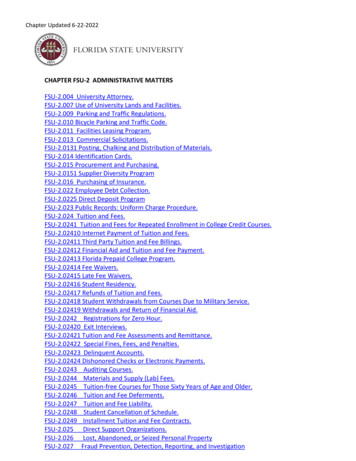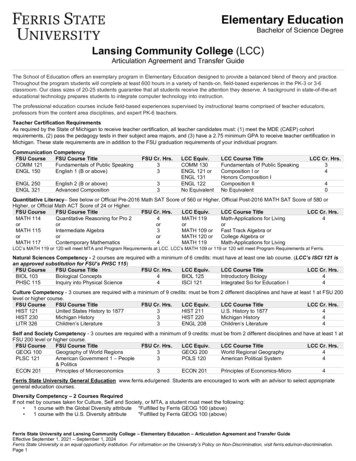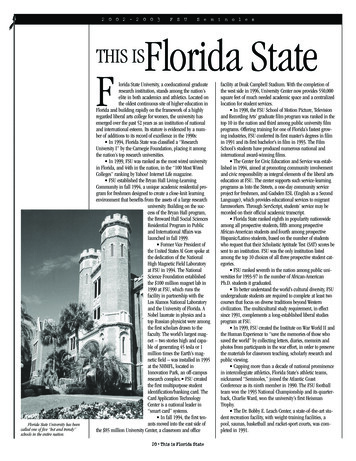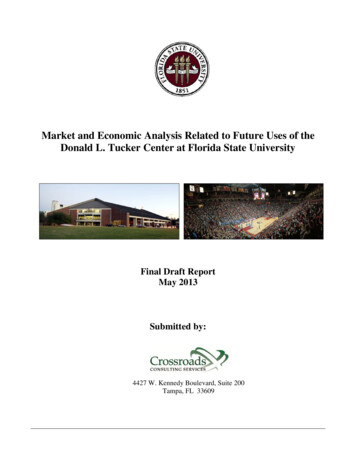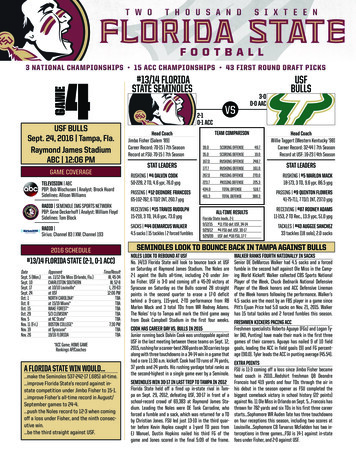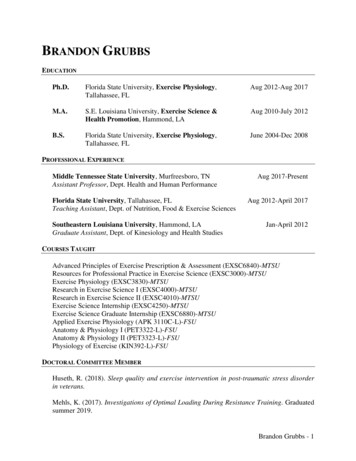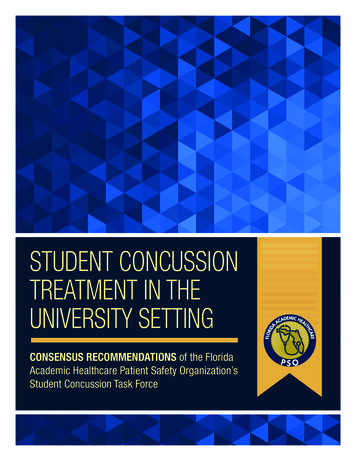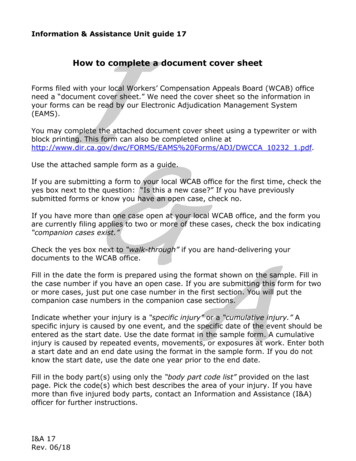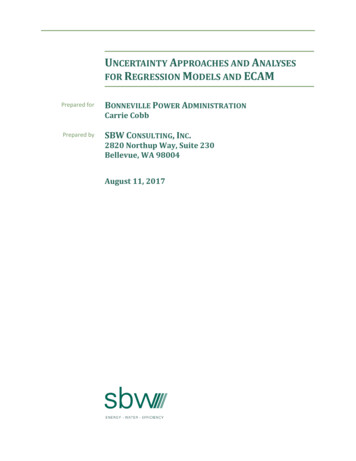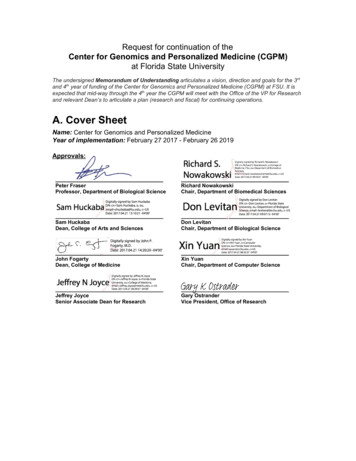
Transcription
Request for continuation of theCenter for Genomics and Personalized Medicine (CGPM)at Florida State UniversityThe undersigned Memorandum of Understanding articulates a vision, direction and goals for the 3rd year of funding of the Center for Genomics and Personalized Medicine (CGPM) at FSU. It isand 4th year the CGPM will meet with the Office of the VP for Researchexpected that mid-way through the 4thand relevant Dean’s to articulate a plan (research and fiscal) for continuing operations.A. Cover SheetName: Center for Genomics and Personalized MedicineYear of implementation: February 27 2017 - February 26 2019Approvals:Peter FraserProfessor, Department of Biological ScienceRichard NowakowskiChair, Department of Biomedical SciencesSam HuckabaDean, College of Arts and SciencesDon LevitanChair, Department of Biological ScienceJohn FogartyDean, College of MedicineXin YuanChair, Department of Computer ScienceJeffrey JoyceSenior Associate Dean for ResearchGaryK OstraderGary OstranderVice President, Office of Research
B. Structure and ReportingOrganizationThe Executive Director will have primary responsibility for overall leadership that willinclude strategic planning, resource development, fiscal management, and publicrelations. The Executive Director will report to the Vice President of Research and willsubmit annual reports to the Dean of the College of Arts and Sciences and the Collegeof Medicine. The Steering Committee will provide input to the Executive Director, adviseon grant proposals, and set the direction of the center.Executive DirectorResponsibilities : Primary leadership of the Center, advising the Scientific Director,management of key operations and initiatives.Peter Fraser, Ph. D.Professor, Department of Biological ScienceCollege of Arts and SciencesFlorida State UniversityRoom 3062 King Life Sciences Building319 Stadium DriveTallahassee, FL. 32306Phone: (850) 644 5037email: fraser@bio.fsu.edu
Scientific DirectorResponsibilities : Primary analyst and manager for scientific projects, management ofCenter personnel (staff and undergraduate students).Daniel Vera, Ph. D.DirectorCenter for Genomics and Personalized MedicineFlorida State UniversityRoom 2008, King Life Sciences Building319 Stadium DriveTallahassee, FL. 32306Phone: (850) 296 8372email: vera@genomics.fsu.eduExecutive Committee:Responsibilities : Overseeing the operational budget, reviewing user proposals, assist inwriting proposals for external funding, seeking new sources of funding.Gary TysonProfessorDepartment of Computer ScienceFlorida State University1017 Academic WayTallahassee, FL 32306Phone: (850) 644 3088email: tyson@cs.fsu.eduDave GilbertProfessorDepartment of Biological ScienceFlorida State University319 Stadium DriveTallahassee, FL 32306Phone: (850) 645-7583email:gilbert@bio.fsu.eduMichelle ArbeitmanAssociate ProfessorDepartment of BIomedical SciencesFlorida State University1115 W Call StreetTallahassee, FL 32306Phone: (850) 645-9846email: michelle.arbeitman@med.fsu.eduJonathan DennisAssociate ProfessorDepartment of Biological ScienceFlorida State University319 Stadium DriveTallahassee, FL 32306Phone: (850) 645 9274email: dennis@bio.fsu.eduMohamed KabbajProfessorDepartment of Biomedical SciencesFlorida State University1115 West Call StreetTallahassee, FL 32306Phone: (850) 644-5495email: mohamed.kabbaj@med.fsu.edu
C. Mission, Goals, and ActivitiesMission StatementThe mission of the Center for Genomics and Personalized Medicine (CGPM) is tofacilitate ongoing research and stimulate new research directions on campus byproviding the intellectual resources for analyses of genomic studies and large biologicaldatasets, at costs that will be a significant savings in grant dollars vs. outsourcing.Without the Center, colleagues who wish to exploit genomics methods and submit grantapplications will be at a serious financial and intellectual disadvantage. The Center willfill the need for a hub for colleagues and will facilitate educational opportunities. TheCenter will serve to create a genomics community on campus and provide continuity forresearch programs when valuable well-trained computational biologists leave theirlaboratories.Goals of the CenterThe dramatic reduction in the cost of sequencing has launched us into the age ofgenomics. Advances in sequencing technologies and methods that utilize thesetechnologies have given researchers the ability to answer large-scale, complexquestions in a wide variety of research areas. To capitalize on these advances, FSU hasmade significant investments in the instrumentation to generate high-throughputgenomic data with the purchases of two Illumina sequencing instruments, the IlluminaHiseq housed in the College of Medicine Translational Science Laboratory, and theIllumina Miseq which is housed in the Department of Biological Science Core Facility.Several researchers on campus have fully capitalized on these investments, leading tosignificant advances in their fields. However, the vast majority of researchers whoseresearch programs may benefit from these technologies lack the intellectual resourcesfor the analysis of large biological datasets. The goal of the CPGM is to provideintellectual support for experimental design and data analysis for FSU researchers,allowing more effective use of recent genomic and proteomic equipment acquisitions byFSU, and positioning researchers to demonstrate feasibility of genomics aims thatcontribute to successful funded proposals to NIH and other agencies and contribute tohigher impact publications. To maximize our impact on FSU research, the CGPM aimsto serve FSU and the broader community in the following major areas: Work closely with the College of Medicine Translational Science Laboratory and theDepartment of Biological Science Core Facility in order to lower the barrier forresearchers to leverage FSU's sequencing instrument purchases (Illumina HiSeqand MiSeq instruments).Enabling an on-campus pipeline from experimental design to data generation andhypothesis testing, interpretation, and publication for genomics experiments.Carry out routine data analyses using existing software at minimal cost.Assist faculty in developing new research areas that require sophisticatedcomputational skills at substantially lower cost than outsourcing.Train graduate students and post-doctoral researchers in genomics and personalizedmedicine to apply these skills in their own labs.
Offer continuity in genomics analysis productivity when laboratories lose talentedcomputational scientists.Foster a community of genomics on the FSU campus by providing a research hub,virtual and physical, for colleagues to interact on big projects.Activities1. Service to Ongoing Research Projects:Dozens of FSU laboratories are currently employing genomic approaches to addressquestions related to their ongoing projects. In many cases these labs lack sufficientintellectual resources to fully take advantage of the large datasets that they have alreadygenerated. The primary goal of the center is to provide genomic data analysis services toFSU researchers. This includes providing data analysis support for the many ongoingprojects that would benefit from additional data analysis support. Faculty seeking dataanalysis services from the CGPM may submit a 1000 word proposal detailing theneeds of the project to the executive committee. The proposal should demonstratefeasibility, impact and likelihood to lead to external funding, and financial support forresources required by the CGPM to complete the project, namely salary support for theScientific Director. These proposals will be reviewed by the Executive Committee as theyare received, and, depending on available funding, projects approved by the executivecommittee may obtain services through three possible financial arrangements tocompensate the CGPM for time required for data analysis: 1) If the faculty member hasfunding available to pay for data analysis support, that person may either request anestimate for the completion of services based on hourly rates established by the auxiliaryaccount, 2) If the faculty member lacks funding to pay for support, the CGPM can assistthat person with the formulation of a proposal to request such funding through anappropriate FSU CRC funding mechanism, or 3) If applying for funds through the CRC isinfeasible (e.g., data analysis services are needed prior to the possibility of receivingCRC funds), then the faculty member will be advised to seek other funding sources (e.g.,PI support account or departmental SRAD).2. Intellectual Support for Innovative Investigator-Initiated New Projects:In addition to our service goals for ongoing projects, we also want the center to stimulatenew collaborations and make new directions of research possible. The use of genomicshas penetrated across diverse disciplines at many institutions with large life sciencesresearch programs, however this has not yet occurred at FSU. This penetration hasadded a new dimension to investigators' research programs, including in the areas ofecology, evolution, immunology, cell biology, molecular biology, and more. The Centerwill make specific efforts to facilitate new research directions at FSU. When a potentialproject is conceptually formulated between the Scientific Director and another facultymember, that faculty member may write a proposal to present to the executivecommittee. However, since these new research directions will typically not be fundedfrom active grants, it is expected that these potential projects will frequently lead tosubmitted CRC, and eventually extra-mural, grant proposals.
3. Education of the FSU community:Our research objectives require a trained staff of programmers, statisticians andbiologists. We believe that this can best be frugally achieved by training students at theundergraduate level to supplement the efforts of graduate students, faculty andprofessional research staff, and to provide a continuous source of trained individuals thatcan transition into the research environment at FSU. By extending recruitment to theundergraduate level, we also provide a unique research training/internship component tosome of our degree programs, specifically computer science, computational biology,statistics, math and biology. The CGPM is currently training four undergraduatestudents. Once trained in standard data analysis pipelines, these students cansupplement existing research groups with entry-level data evaluation. In addition, thestudents in the lab would be trained to assemble genetic sequence data for previouslynon-sequenced species that are important to the state of Florida’s ecology or economy.In addition to the training opportunity, this sequencing effort will enable studentsgraduating from FSU to stand out compared to their peers at other institutions whencompeting for jobs, positions in medical schools, or graduate level admissions in theirarea of study. We believe that it will also open new opportunities for fundraising as wellas increase the public awareness of the unique possibilities available to students at FSU.In addition to undergraduate training opportunities, graduate students and postdocs inlaboratories collaborating with the CGPM will also have training opportunities as part ofongoing projects. As part of ongoing projects, faculty may also request individualizedtraining to occur alongside data analysis being performed by the Scientific Director.Finally, the CGPM will regularly hold workshops during the monthly Genomics UserGroup that is run by the CGPM and held in the College of Medicine. These workshopswill focus on basic data analysis pipelines that will introduce students, postdocs, andfaculty to genomic data analysis and enable them to perform their own analyses.D. Progress, Challenges, and OpportunitiesAs more FSU faculty integrate genomic approaches into their research programs, thedemand for expertise in genomic data analysis increases. During the two-year trialperiod, the CGPM had a minimum barrier for access to its services in an attempt toreach as many researchers on campus as possible. This low barrier has allowed theCenter to engage in over 16 projects with faculty spanning four departments (seeattached summary of activities), resulting in 16 grant proposals, and 15 publications ormanuscripts in preparation or review. Despite these accomplishments, the additionalresponsibilities of education, outreach to other departmental units, and administrationimposed a significant time burden for the Director, and led to compromises in efforts tonon-research activities. Thus, given the available resources, the CGPM is now currentlyunable to meet the increasing demand for genomic expertise in addition to successfullyfulfilling its other objectives and responsibilities.Three changes will be implemented in the operation of the center to address theseissues. First, as originally proposed but not yet implemented in the formation of thecenter, the CGPM will require short ( 1000 word) proposals to be written byinvestigators seeking services from CGPM. Secondly, the CGPM will limit pro bono work
to letters of support and minor revisions for grants in order to indicate feasibility forgenomic activities, and short-term consulting (initial 60 minute consultation). Any workoutside this scope would require a project proposal submitted and approved by theExecutive Committee, and a funding arrangement in place for CGPM services. Forfaculty seeking extensive involvement by the CGPM for the preparation of a grantproposal, proposals for such requests would be submitted to the Executive Committeeas required for scientific projects, as described above for "Service to Ongoing Projects."All ongoing pro bono work will be phased out within the first two months upon approvalof the renewal of the center. Finally, an additional no-cost position of “Executive Director”will be created in the center, and its structure modified to account for this position. Theoriginal activities of the previous Director will now be shared among two positions: anExecutive Director that acts as an administrator and liaison for the group, and managerof CGPM activities at a high-level, and a Scientific Director that is responsible for themanagement of projects and additional personnel under the center, data analysis,consulting, and other activities related to the scientific and educational operations of thecenter. The Executive Director position will be filled by Dr. Peter Fraser, the newly-hiredFowler Endowed Chair and Professor of Biological Science. The Scientific Directorposition will be filled by Dr. Daniel Vera, the current acting Director of the Center.Altogether, these three changes are expected to prioritize (albeit initially reduce thenumber of) projects taken on by the Center, recover costs associated with the operationof the center, incentivize Faculty to use CGPM resources parsimoniously, and permit theScientific Director to focus on the science. As this structure takes hold, we anticipatereaching near complete self-sufficiency, demand outweighing supply, and natural growthof the center through the hiring of new staff to meet the demand. Additionally, emphasiswill be placed on facilitating new research directions in the broader FSU researchcommunity. This will be accomplished through multiple efforts, including 1) identifyingand contacting faculty whose research programs may benefit from genomics, 2) holdingseminars in departments that may benefit from genomic expertise, including in EOAS,chemistry, biology, biomedical sciences, and the CML, so that graduate students andpost-docs become aware of the services we offer and 3) attending and engagingindividuals at events across departments involving faculty, postdocs, and students, suchas symposia and postdoc/student scientific events.E. FundingInitial funding for the center during the first two years was provided from the Office ofResearch (Director salary), College of Arts and Sciences ( 15,000/year, to support theoperational budget), and the College of Medicine ( 15,000/year, to support theoperational budget). An additional two years of similar support from the Office ofResearch, the College of Medicine, and the College of Arts and Sciences is requested.Appointment of the current Director on active grants partially supplants support from theOffice of Research, and the recovery of the Scientific Director's salary is expected toincrease through grant appointments and service fees. A budget for 2017-2018 hasbeen included in Appendix A.
Service FeesAn auxiliary account will be established for service fees, which will be managed theDepartment of Biological Science. Additional support from investigators for the ScientificDirector's salary and OPS wages will be earned exclusively through an hourly servicefee based on the Scientific Director's annual expenses of salary, fringe, and benefits,and OPS wages. A fee schedule for specific data analysis services will be formulated bythe CGPM in consultation with the Office of Research, within the 2 months of the start ofthis renewal period (2017-2019). For data analysis requests in which time cannot beeasily estimated (open-ended projects, custom or new types of data analysis), hourlyrates will be used to bill for services.SRAD DistributionAs proposed in the creation of the center, the CGPM did not receive SRAD distributionfor the first two years. For each proposal that includes support for the Center, SRADdistribution will be negotiated by the proposal's PI and the Director of the CGPM.Twenty-five percent of SRAD attributable to CGPM activities will be apportioned to TheDepartment of Biological Science to support facilities and administrative servicesprovided by Biology directly to the CGPM, including the management of the auxiliary andoperating accounts, space utilized by CGPM in the King building, and IT support. SRADdistributions will be codified in a signed Memorandum of Understanding and reviewedannually.Distribution of Credit for PatentsCredit for patents will follow the Intellectual Property and will be prorated on thecontribution of each of the inventors, in accordance with the policies and procedures setforth in Section 6 of the FSU Faculty Handbook.Faculty and Staff PositionsOne Research Faculty I at 1.0 FTE will act as the Scientific Director. The VP ofResearch is responsible for the balance of salary of the Scientific Director not paid byrevenue received from grant appointments and service fees. Additionally, an OPSemployee will be employed by the center based on demand for services. Theresponsibilities of this staff member would be to run standard pipelines, maintain theCGPM website, and carry out other IT tasks (database management, installing software,etc). OPS wages will be funded by both an auxiliary through which service fees for theOPS time will be recovered, and any balance of wages not recovered by OPS servicefees will be paid with the CGPM operating budget.Plan for Center GrowthAs previously discussed, we propose that once 50% of the Scientific Director's salary isencumbered and sustainable over a two-year period, a second research faculty positionwill be created and initially supported by the Office of Research. The purpose of anadditional faculty position is to allow the continued growth of the center by providing theadditional capacity for data analysis. We expect the CGPM to grow through additional,
self-generated support for new positions, and we anticipate in the near term that thesupport provided by the OVPR directly to the Center will not exceed 1.5 research facultypositions. In the long term, we anticipate the personnel costs to the OVPR to remainunder 20% of the total cost for personnel.ExpectationsAt the end of the two-year period the CGPM will negotiate with the Administrationincluding the VP of Research and Academic Deans to identify the most appropriatesources of ongoing support for the Center.
Appendix A: Budget and Cash Flow ProjectionThe Office of Research will provide salary support for the Scientific Director that is notrecovered by other projects. Approximately one quarter of the Scientific Director's salaryis currently recovered on existing grants, and this support will be maintained throughoutthe next two years, spanning the entirety of this agreement. Additional salary supportmay be recovered from grant appointments on grants under review that may be funded,however, all grant proposals submitted after this renewal agreement is approved will useservice fees to recover the Scientific Director's salary. Forty percent of the ScientificDirector's salary is projected to be recovered through service fees in year one, and fiftypercent in year two. The College of Medicine and The College of Arts and Sciences willeach provide 15,000 per year over the next two years toward the operating budget ofthe Center. The operating budget is intended to support travel costs for scientificmeetings ( 6000/year), computer supplies to support the activities of the center( 7000/year), and other expenses to support the operation of the Center, includinglaboratory and office supplies and OPS wages. An OPS staff member will be employed,and the number of weekly hours will determined based on the needs of the Center. Fiftypercent of a 3/4-time OPS salary is expected to be recovered through service fees overthe course of the next two years, and any wages not recovered by service fees will bepaid from the CGPM operating budget.ExpendituresSci. Director salarySci. Director fringe healthOPS Tech salaryOPS Tech fringeTravelComputer suppliesOther ExpensesTOTAL EXPENDITURESyear 3 73,460.00 30,196.52 20,358.00 559.85 6,000.00 7,000.00 6,541.08 144,115.44year 4 73,460.00 30,693.52 20,358.00 559.85 6,000.00 7,000.00 6,541.08 144,612.44total 146,920.00 60,890.04 40,716.00 1,119.69 12,000.00 14,000.00 13,082.16 288,727.89AllocationsCollege of MedicineCollege of Arts and SciencesOffice of ResearchSalary Allocation from GrantsSci. Director Service feesOPS Service feesTOTAL RECEIPTS 15,000.00 15,000.00 36,279.78 25,914.13 41,462.61 10,458.92 144,115.44 15,000.00 15,000.00 26,038.38 26,038.38 52,076.76 10,458.92 144,612.44 30,000.00 30,000.00 62,318.16 51,952.51 93,539.37 20,917.85 288,727.89source spreadsheet
Appendix B: Summary of CGPM ActivitiesFebruary 2015 through February 2017CGPM has co-authored manuscripts or publications with thefollowing faculty: Choogon Lee, Department of Biomedical SciencesYi Ren, Department of Biomedical SciencesHengli Tang, Department of Biological ScienceJames Fadool, Department of Biological ScienceWu-min Deng, Department of Biological ScienceHank Bass, Department of Biological ScienceJonathan Dennis, Department of Biological ScienceDave Gilbert, Department of Biological ScienceCGPM has been co-Investigator or co-PI on grants with the followingfaculty: Jamila Horabin, Department of Biomedical SciencesYanchang Wang, Department of Biomedical SciencesAmy Baco-Taylor, Department of EOASKaren McGinnis, Department of Biological ScienceHank Bass, Department of Biological ScienceDave Gilbert, Department of Biological ScienceJonathan Dennis, Department of Biological ScienceManuscripts Matthew D’Alessandro, Stephen Beesley, Jae Kyoung Kim, Zachary Jones,Rongmin Chen, Kathleen Kyle, Daniel Vera, Wayne Cheng, Paul Yi, MichellePagano, Richard Nowakowski, Choogon Lee. "Disruption of PERIODdegradation causes instability of circadian rhythms." Submitted .Jianshe Lang, Yichen Cheng, Alyssa Rolfe, Christy Hammack, Daniel Vera,Kathleen Kyle, Jingying Wang, Yi Ren, Chad Cowan, Hengli Tang. "AhPSC-derived macrophage model reveals distinct cellular responses to Zika anddengue viruses." Submitted .Sergiusz Wesolowski, Daniel Vera, Wei Wu. "SRSF shape analysis forsequencing data reveal new differentiating pattern." Submitted .Kathleen Kyle, Daniel Vera. "gtracks: a framework for creating and maintainingUCSC track databases using google spreadsheets." In preparation.Takayo Sasaki, Juan Carlos Rivera-Mulia, Daniel Vera, Jared Zimmerman,Sunny Das, Michelle Padget, Naoto Nakamichi, Bill H. Chang, Jeff Tyner, BrianJ. Druker, Andrew P. Weng, Curt I. Civin, Connie J. Eaves, and David M. Gilbert."Stability of patient-specific features of altered DNA replication timing inxenografts of primary human acute lymphocytic leukemia." In preparation.Claire Marchal, Takayo Sasaki, Daniel Vera, Korey Wilson, Jiao Sima, JuanCarlos Rivera Mulia, Coralin Nogues, Ebtesam Nafie*, David M. Gilbert.
"Repli-seq: genome-wide analysis of replication timing by next-generationsequencing." In preparation.Rajiv Parvathaneni, Daniel Vera, Md Shamimuzzaman, Hank Bass, AndreaEveland. "Genome-wide mapping of hypersensitive footprints in chromatin ofdeveloping maize tassels predicts regulators of inflorescence architecture." Inpreparation.Carson Andorf, Kevin Ahern, Fang Bai, Omer Barad, W. Brad Barbazuk, HankW. Bass, Kobi Baruch, Gil Ben-Zvi, Edward S. Buckler, Robert Bukowski, R.Kelly Dawe, Ruth Davenport, Hugo K. Dooner, Limei He Du, Chunguang Du,Katherine A. Easterling, Christine Gault, , Jiahn-Chou GuanGeorg, Jander,Yinping Jiao, Karen Koch, Guy Kol, Toru Kudo, Qing Li, Fei Lu, DustinMayfield-Jones, Wenbin Mei, Don McCarty, John Portwood, Gil Ronen, Mark A.Settles, Doron Shem-Tov, Ilya Soifer, Nathan M. Springer, Masaharu Suzuki,Daniel L. Vera, Erik Vollbrecht, Julia T. Vrebalov, Doreen Ware, KokulapalanWimalanathan, Wenwei Xiong and Thomas P. Brutnell. "The maize W22genome: a foundation for gene discovery and functional genomics.” Inpreparation.Publications Lang, J, Vera D, Cheng Y, and Tang H. 2016. “Modeling Dengue Virus-HepaticCell Interactions Using Human Pluripotent Stem Cell-Derived Hepatocyte-likeCells.” Stem Cell Reports 7 (3): 341–54.Sotolongo-Lopez M., Alvarez-Delfin K., Saade C. J., Vera D. L. , Fadool J. M.Genetic Dissection of Dual Roles for the Transcription Factor six7 inPhotoreceptor Development and Patterning in Zebrafish. In press, PLoSGenetics.Rodgers-Melnick E., Vera D. L., Kellogg A. E., Bass H. W., Buckler E. S. OpenChromatin Reveals the Functional Maize Genome. In press, PNAS.Lo PK, Huang YC, Poulton J, Leake N, Palmer WH, Vera DL, Xie G, Klusza S,Deng WM. Belle/DDX3, a novel piRNA modulator, regulates expression oftransposable elements and transgenes in Drosophila ovaries. Inpress.Developmental Biology (IF3.5) .Dileep, V., Ay, F., Sima, J., Vera, D. L., Noble, W. S., & Gilbert, D. M. (2015).Topologically-associating domains and their long-range contacts are establishedduring early G1 coincident with the establishment of the replication timingprogram. Genome research , gr. 183699.114.Druliner, B., Vera, D. L., Johnson, R., Ruan, X., Apone, L., Dimalanta, E.,Stewart, F., Boardman, L., Dennis, J. H. (2015). Comprehensive nucleosomemapping of the human genome in cancer progression. Oncotarget.Sexton, B. S., Druliner, B. R., Vera, D. L., Avey, D., Zhu, F., Dennis, J. H. (2016).Hierarchical regulation of the genome: global changes in nucleosomeorganization potentiate genome response. Oncotarget.Grant Proposals“Cis-Acting Elements Regulating Developmental Control of Replication Timing” Status: Awarded Agency/program: NIH R01 Role: Co-Investigator
Period: 5 year, 2,895,232 Lead PI: Gilbert, Department of Biological Science Percent Effort if awarded: 16.7%“Nuclease Profiling as an Integrative Resource for Maize Epigenomics” Status: Awarded Agency/program: NSF PGRP Role: co-Principal Investigator Period: 4 year, 2,059,572 Lead PI: Hank Bass, Department of Biological Science Percent Effort: 12.5%"PippinHT for Illumina sequencing library preparation" Status: Awarded Agency/program: FSU CRC EIEG Role: PI Period: 1 year, 21,500 Lead PI: Daniel Vera, CGPM"Transcriptomic Profiling of Synchronized Pancreatic Islets" Status: Awarded Agency/program FSU CRC PG Role: Collaborator Period: 1 year, 13,000 Lead PI: Michael Roper, Chemistry"Linking chromatin dynamics to breast cancer progression" Status: Pending Agency/program FDOH-Bankhead-Coley Role: Collaborator Period: 3 year, 1,326,924 Lead PI: Jonathan Dennis, Department of Biological Science Percent Effort: 5%"Oxidative DNA "damage" and repair in transcriptional signaling; impact onclassification of somatic variants" Status: Pending Agency/program: NIH R01 Role: co-Principal Investigator Period: 5 year, 962,019 Lead PI: Hank Bass, Department of Biological Science Percent Effort: 20%"Origin and significance of altered DNA replication timing in pediatric leukemia" Status: Pending Agency/program: FDOH-Bankhead-Coley Role: Additional Faculty Period: 3 year, 1,500,000 Lead PI: Dave Gilbert, Department of Biological Science Percent Effort: 10%"ERA CAPS: I-YIELD / IMPROVING CROP YIELD" Status: Pending Agency/program: John Innes Centre ERA-CAPS
Role: Additional Faculty Period: 3 year, 362,050 Lead PI: Hank Bass, Department of Biological Science Percent Effort: 0%"Identification of the functional genome across diverse eukarya" Status: Pending Agency/program: NSF MCB Role: Co-PI Period: 5 year, 1,630,075.00 Lead PI: Jonathan Dennis, Department of Biological Science Percent Effort: 10%“Origin and significance of altered DNA replication timing in pediatric leukemia” Status: Declined, under revision for resubmission Agency/program: NIH R01 Role: co-Investigator Period: 5 year, 2,270,383 Lead PI: David Gilbert, Department of Biological Science Percent Effort: 16.7%“Shaping of Chromatin By the RNA Silencing Machinery” Status: Declined, under revision for resubmission Agency/program: NIH R01 Role: co-Principal Investigator Period: 5 year, 1,483,798 Lead PI: Jamila Horabin, Department of Biomedical Sciences Percent Effort if awarded: 10%“Inter-Chromosome Interaction And Its Resolution” Status: Declined, under revision fo
Florida State University 319 Stadium Drive Tallahassee, FL 32306 Phone: (850) 645-7583 email:gilbert@bio.fsu.edu Michelle Arbeitman Associate Professor Department of BIomedical Sciences Florida State University 1115 W Call Street Tallahassee, FL 32306 Phone: (850) 645-9846 email: michelle.arbeitman@med.fsu.edu Jonathan Dennis Associate Professor
